Thought Leadership Studio Podcast Episodes:
Unpacking Biases and Building Bridges: Dr. Poornima Luthra's Approach to DEI
Episode 61 -Empowering Change Through Insight: Dr. Poornima Luthra's Journey in Transforming Diversity, Equity, and Inclusion Perspectives
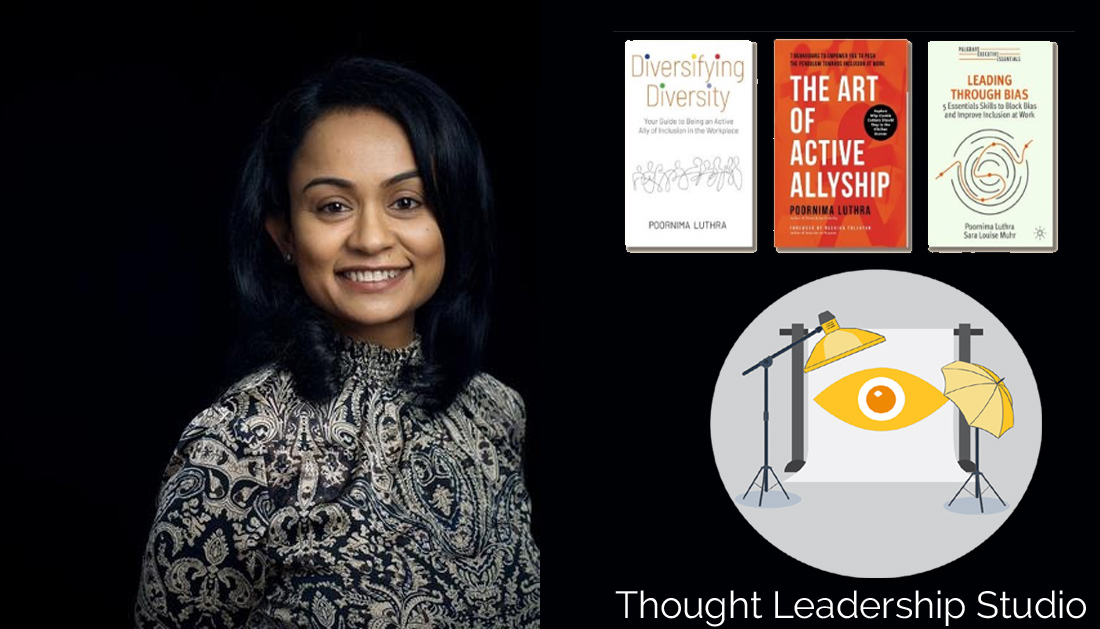
#authors, #dei, #insight, #inspiration, #interviews, #thoughtleadership, #thoughtleadershipexamples
Or Click here to listen or subscribe on appWhat this episode will do for you
- Understand Diversity Beyond Surface Level: Explore with Poornima Luthra how diversity encompasses not just visible traits but also a rich tapestry of backgrounds, experiences, and thoughts, challenging the narrow perceptions of diversity in organizations.
- Embrace the Concept of 'Diversifying Diversity': Delve into Poornima's holistic approach to diversity, equity, and inclusion, understanding the intersectionality of various identity aspects and their impact in the workplace and society.
- Navigate Personal Biases and Privilege: Gain insights on recognizing and addressing individual biases and privileges, learning how acknowledging these can be a powerful tool for positive change in DEI initiatives.
- Active Allyship in Practice: Discover the seven key behaviors for effective allyship from Poornima's book "The Art of Active Allyship," and learn how to apply these principles in both personal and professional settings.
- Learn Practical Steps for Personal Growth in DEI: Discover actionable steps individuals and organizations can take to foster a deeper understanding and practice of diversity, equity, and inclusion.
Dr. Poornima Luthra
In this episode, I'm excited to host Dr. Poornima Luthra, a notable DEI expert and founder of TalentED Consultancy. With over 15 years in DEI research, education, and practice, Dr. Luthra is globally recognized, including being named a top thinker by Thinkers50.
Her acclaimed book, "The Art of Active Allyship," and regular Harvard Business Review contributions showcase her blend of academic and practical insights.
Dr. Luthra discusses her journey as a woman of color in a male-dominated field, addressing biases, and advocating a comprehensive approach to DEI. She emphasizes actionable steps for DEI advancement, leveraging her experience from keynotes, books, and workshops.
Holding positions at Copenhagen Business School and Singapore Management University, Dr. Luthra has received multiple awards, including the 2021 Impact Award and the 2023 Nordic Blaze Inclusion Award.
This conversation delves into DEI's complexities and practical integration into daily life and corporate culture. Dr. Luthra invites further engagement via LinkedIn.
Some of Dr. Luthra's coordinates:
Curated Transcript of Interview with Dr. Poornima Luthra
The following partial transcript is lightly edited for clarity - the full interview is on audio. Click here to listen.
Chris McNeil: I'm Chris McNeil, with Thought Leadership Studio, and I'm sitting here across the Atlantic Ocean with Dr. Poornima Luthra, who's a globally renowned expert in DEI or diversity, equity and inclusion. She's an associate professor at the Copenhagen Business School and is one of the thinkers 50 of 2023 ... and has a lot more to her background that we'll talk about, I'm sure. Welcome.
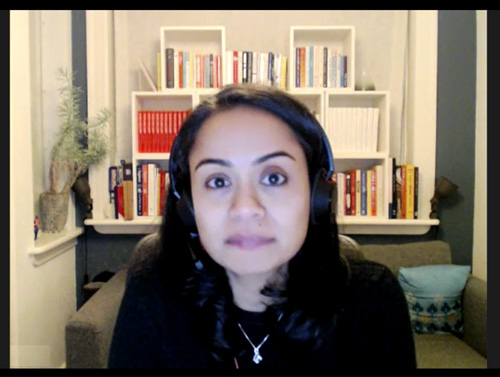 Dr. Poornima Luthra: Thank you so much, Chris. Thanks for having me.
Dr. Poornima Luthra: Thank you so much, Chris. Thanks for having me.
Chris McNeil: Pleasure to have you. So to introduce our audience to you and where you're coming from, please share what sets you on the path that you're on now with being at the forefront of the movement towards diversity, equity, and inclusion, and why is that path meaningful to you?
Dr. Poornima Luthra: That's such a great question. It takes me down memory lane, right a little bit. I have what is known as a squiggly career. So I started off with at the age of 18, needing to make a choice about what line of study I wanted to get into. And when you come from a South Asian background, there were really three choices available to you. You can either become a doctor, a lawyer, or an engineer.
The Squiggly Path
I always wanted to study HR. I always had an interest in people and people's behaviors, but that was not seen to be a wise career choice according to the people around me, my family. And so thankfully I was good at math and science. And so that naturally led me to doing an engineering degree. And it was interesting, during the engineering degree, I did all right, but I always enjoyed the cross faculty courses that I did from the business school, understanding human behavior, and those were always the courses that I did really well in.
 So I think through that process, while I did enjoy engineering, it was also some of the experiences that I had during that time that led me to move down the pathway of moving towards talent management and specifically with diversity, equity and inclusion. So I was one of a handful of women in the engineering cohort I was a part of.
So I think through that process, while I did enjoy engineering, it was also some of the experiences that I had during that time that led me to move down the pathway of moving towards talent management and specifically with diversity, equity and inclusion. So I was one of a handful of women in the engineering cohort I was a part of.
I was often the only woman and certainly only woman of color in the tutorial groups I was a part of. And so when I looked around me, there were not many instructors. In fact, I don't think I had a single instructor who looked like me or who was female. And when I looked at the companies around me, the big companies that I aspired maybe to be a part of, when I looked at their leadership teams again, there was no one who looked like me.
And so it became quite clear to me that this was possibly not an industry that would welcome me into it and certainly not one that I could see myself growing in. And so I moved from there in what I call my squiggly career towards HR and doing my doctorate, my PhD in that area. And it was during my PhD program that I really came to understand more about the theoretical lenses around diversity, equity, and inclusion.
And that sparked off, of course, my interest within the area to really get into it and begin my research in that space. But that's of course what I've talked to you about is my career and my academic background. But I do think that a lot of this was in me, even as a child.
If you ask my parents, my parents will tell you that from a very young age, I used to bring up and be confused about or ask questions about inequity and inequality that I saw around me. It would affect me very deeply whenever I had chances to do some part-time work or voluntary work, I would always choose organizations where I could give back to those who are from underrepresented, marginalized, discriminated groups.
And so I think it was in me a lot earlier, but of course, thankfully through my squiggly career, managed to find the pathway to actually being able to make this more concrete. And that's where really the path began with going down the journey of researching and teaching in the area of diversity, equity, and inclusion.
Chris McNeil: Well, I love squiggly career paths. It gives you a diversity of background, doesn't it? ... a diversity of perspectives? And isn't your mission about the value of a diversity of perspectives, in a sense? Where does your mission come from?
Dr. Poornima Luthra: So a few things. So when I look at diversity, of course, diversity of thought is one part of it, but it's really thinking about holistically about diversity, really looking at diversity of backgrounds, of skills, of experiences. So I'd like to think of it more holistically, and that's what I do in my first book, Diversifying Diversity is really to get more on the table, to get companies to really think about, yes, the physical physiological aspects, really thinking about the social and lifestyle aspects, but also the cognitive aspects.
Diversifying Diversity
So all of it comes together to really looking at the intersectional thumbprint, diversity thumbprint that we all show up with. And for me that's really important that it's not just one aspect, it's all of these that add to the richness of experiences that people bring into the workplace, that they're able to look at issues and problems and challenges from multiple different perspectives. And that's the value of this. So it's not just diversity of thought, it's also backgrounds, it's also experiences, it's also skills. It's different ways in which we approach things. So there's a lot to, it comes when we want to embrace and if we want to embrace diversity in its true sense.
Chris McNeil: So what do you develop diversity in? How we address diversity? Kind of like "meta diversity".
Dr. Poornima Luthra: That's why I call it diversifying diversity.
Chris McNeil: Yeah, I love it. It's kind of the whole system thing.
Dr. Poornima Luthra: Exactly. And we have a very narrow view of diversity in our organizations because we love to measure. And what gets measured is what gets done. And that's the reality of the world that we live in or the way that our companies are set up. And so the metrics that we can track and trace, the visible dimensions are the ones that we focus on.
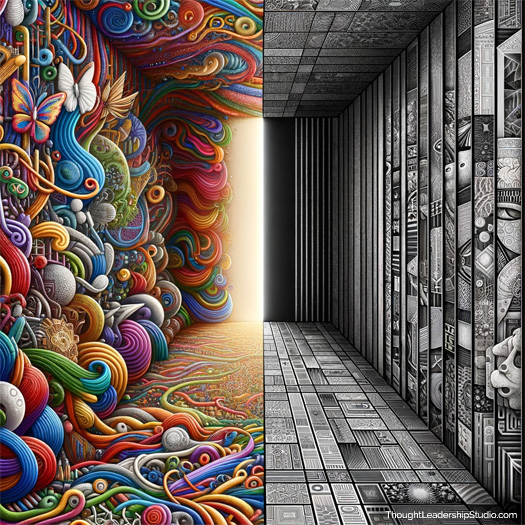 And if you're sitting in a part of the world like where I am in Copenhagen and Denmark, in Europe, there is only literally gender and nationalities are the only two dimensions with data protection laws that you actually can track and trace, which means that the scope of diversity becomes extremely narrow. And these two are extremely important aspects of diversity. Of course, gender, nationality, ethnicity, culture, race, they're all extremely important, but they don't exist in isolation.
And if you're sitting in a part of the world like where I am in Copenhagen and Denmark, in Europe, there is only literally gender and nationalities are the only two dimensions with data protection laws that you actually can track and trace, which means that the scope of diversity becomes extremely narrow. And these two are extremely important aspects of diversity. Of course, gender, nationality, ethnicity, culture, race, they're all extremely important, but they don't exist in isolation.
They intersect with so many other dimensions. And so when we look at diversity from a rather myopic lens, then we try to solve for something without really addressing those system structures, policies, practices that surround it. And then we are trying to solve for a very narrow view without realizing that in doing so, we actually sometimes cause more harm than actually benefit because we are trying to address one particular aspect.
The Complexity of Bias in Organizational Structures
Chris McNeil: So I need to avoid these narrow points of view in addressing the situation, obviously. So if you could make any difference that you could, if you had a magic wand and you could wave it and create any difference you could with your teaching and your books and your speaking, how would the world be different?
Dr. Poornima Luthra: Oh, that's such a beautiful question. I write at the end of my second book, the Art of Active Allyship, that I wish I was out of a job. And I don't know how many people can say that I wish I lived in a world where someone like me and the work that I do is not necessary.
So the world that I would love to see is one where there is true equity, where there's true inclusion, where people can show up to be their whole unique selves, be valued for it, be respected for it in all environments, in organizations of course, where it's the large part of my work is focused on, but also in societal systems when it comes to education and healthcare and political systems and any other societal systems, really thinking about every aspect of our lives where this idea of bias discrimination doesn't exist.
But of course, that's an ideal sense. And I also write on the back of my first book diversifying that if you have a brain, you're biased. So it's just the way our human brains function in many ways. So we can't eliminate bias, we can block it. So I guess my vision and hope is that we block bias, address discrimination and show equity so that people are really valued for who they are and the uniqueness that they bring in. And then there's true inclusion for all.
Chris McNeil: So maybe you're bringing in what you might call, or some might call a self-correcting feedback loop to compensate for the human mind's natural tendency to generalize and distort and delete information.
Dr. Poornima Luthra: Yeah, absolutely. And that is how the mind Works.
Chris McNeil: But also we need people to notice these inequities that come as a result of this are there to wake us up. And that's a really powerful mission that you have.
Dr. Poornima Luthra: Thank you.
Chris McNeil: Well, If you could create systemic change in organizations, and you talked about, and we were looking at how having the wrong measures or too few measures are only focusing on what can easily be measured which can distort your view of the wonderful kaleidoscope of human capabilities we have around us...
... What are the primary obstacles in thinking and organizational structure and a thinking that drives structure that you see as levers for change in making a difference there?
Dr. Poornima Luthra: So I think there are a few challenges, and I think the two that are most important for us to put on the table is bias at the individual level, collective level, systemic, institutional level. And so we need to address this, and you've rightfully pointed out that we need to have systems in place and processes in place that help us to be able to block that bias because bias is there, it's not going anywhere.
I think, as I often say in my keynotes, if anyone promises you that you can be de-bias or unbiased or any of those synonymous to that, that's false marketing. So the human brain is naturally going to be biased. The mental shortcuts, heuristics, algorithms that we use are essential to how we process the vast amount of information coming our way. There's no running away from it. The question is how do we ensure that we have the system structures, policies and practices in place that will enable us to block that?
And the reality though is the challenge is that in our organizations, they're set up to favor some and not others. Our systems, our structures, they've all been set up at a time that favors certain groups, the dominant groups in our organizations and not others. So there is an inequity in the system itself. And so we need to reprogram in that way. We need to rebuild these systems and structures.
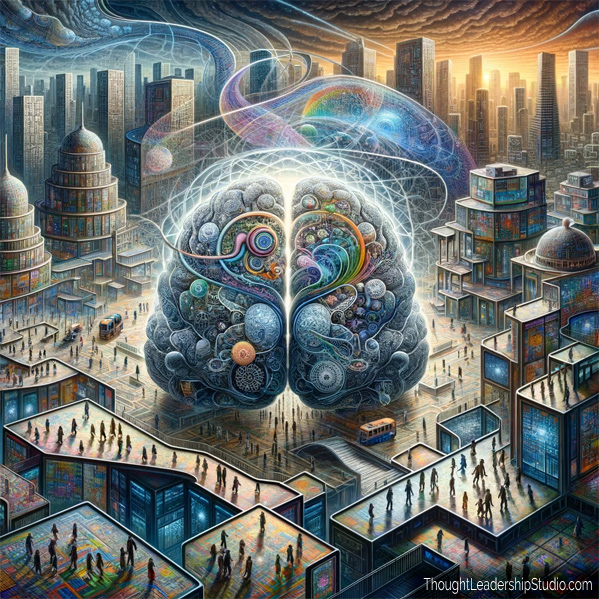 And unfortunately, that requires a lot of effort. That requires resources, that requires commitment. And it's not something that happens overnight, right? It's not something that you can change in a year. It takes time. And so there needs to be consistent effort towards it. And there's no quick fix to this. And I think that is what I think a lot of organizations really struggle with. Holding onto this, making sure you're committed, making sure that you're diverting resources for the long haul.
And unfortunately, that requires a lot of effort. That requires resources, that requires commitment. And it's not something that happens overnight, right? It's not something that you can change in a year. It takes time. And so there needs to be consistent effort towards it. And there's no quick fix to this. And I think that is what I think a lot of organizations really struggle with. Holding onto this, making sure you're committed, making sure that you're diverting resources for the long haul.
So one aspect is bias, and that of course relates to what you said around structures and all of those things that need to be addressed. There is another one, which is kind of if you ask me the elephant in the room that we don't want to talk about, and that's fear. There's a lot of fear when it comes to diversity, equity, and inclusion. There's a lot of fear that people have from both groups, from those who are well-represented, and those who are underrepresented for the well-represented.
It's the fear of saying and doing the wrong thing, not knowing the vocabulary to have conversations around it. It's the fear of is this going to make me in some ways lose my power and space that I have enjoyed occupying? So there is a lot of fear for the well-represented, but there's also fear for the underrepresented being seen as the token, the tick box to satisfy the quota or the target, the constant woke police or being labeled as the woke police, the one who is always addressing the discrimination at play and the fatigue that comes with it, and also the career impact on people's career of being perceived that way of constantly addressing bias and discrimination.
So there's a lot of fear in this space, and I think that that is something that's my current research actually really unpacking that fear, really trying to understand what fear in DI really looks like because we see resistance, we see lots of evidence in fact of resistance to DEI, and resistance comes from fear. And so it's unpacking that fear to really understand because if we get to the heart and the core of that, I fundamentally believe that if we're able to address the fear and talk about fear and make it all right, create the psychologically safe environments to have those conversations around fear, then I fundamentally believe that then we'll be able to make that shift and that change that we want to see because it is that resistance that's holding us back.
Transforming Fear into Inclusive Mindsets
Chris McNeil: I'll bet. And I want to loop back to speak to those who are listening and resonate with their values around being successful and that this can help you succeed, this can help open yourself up to a kaleidoscope would be my metaphor of perspectives and capabilities and actions and all the things that you talk about in diversifying diversity that your organization wouldn't have access to without the opening of the minds.
So I want to loop back to that, but before that, we're talking about fears. In my world, fears are based on mental models, usually faulty ones. And you mentioned a few of those on both sides. One is fear being perceived as a token on one side, and the other is fear of losing power on the other side. And there's always an if-then statement behind a mental model: "If there's more diversity, I'll lose power because I'm the dominant one now". Or "If I get this advancement, then I'll be perceived as a token because there's an incentive for that".
What would be some countering better belief systems that you would offer to remove the need for even having the fear in these situations?
Dr. Poornima Luthra: And that's actually what I'm unpacking right now to see what does it take to really address that. But what my research so far and the work that I've done so far, what it shows is again, creating new mental models. So creating inclusive mindsets, shaping inclusive mindsets, that is core and key here. And of course that means that we need to be able to rewire in that sense or create new neural pathways in our brain around what inclusion looks like and how do we show up to be an inclusive person.
And inclusion is one of those terms that is fundamental to this, but it's also one that's quite difficult to understand. What does it take from me to be inclusive? And the question that often comes up is, what can I do? What can I really do to nurture those inclusive spaces? And that is, of course, a reflection of these inclusive mindsets, inclusive mental models.
And so part of my work is really helping, or one aspect of my work is really helping individuals feel empowered to shift their mindsets and to exercise that part of, or develop in fact that muscle because sometimes we may not necessarily have it developed well enough to be able to use it when needed. And so it's about developing it, strengthening it, and making sure that it's a muscle, it's a mental model, it's a muscle that comes into play. The minute we notice discrimination, the minute we notice that we can be more inclusive to someone from an underrepresented group under-recognized group.
And so that is a big part of what I do around allyship, right? Really empowering individuals with the behaviors that they need to be able to shift their mindset towards being inclusive. So that's what I think it will take fundamentally underlining it to be able to overcome that fear.
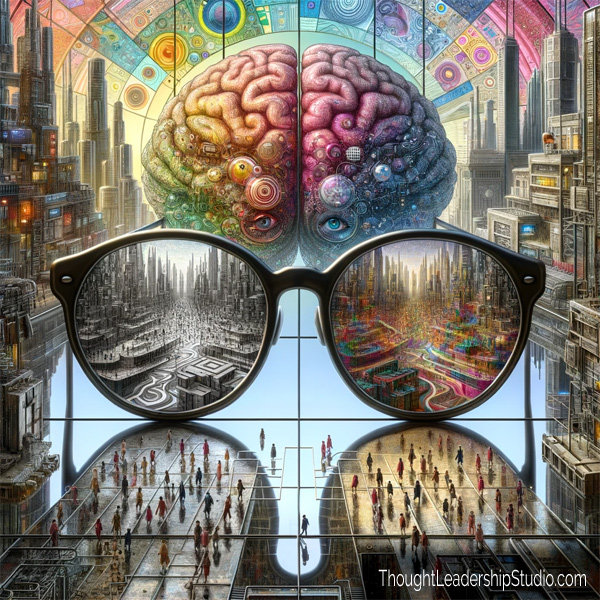 But first we also need to understand that fear a bit more. I think there's more work to be done in that space to say, well, what does that fear look like? And if we can put words to it, then we address the elephant in the room that no one wants to talk about. Because right now it's all good to talk about inclusion, it's all good to talk about active allyship.
But first we also need to understand that fear a bit more. I think there's more work to be done in that space to say, well, what does that fear look like? And if we can put words to it, then we address the elephant in the room that no one wants to talk about. Because right now it's all good to talk about inclusion, it's all good to talk about active allyship.
And I do that. That's very much a part of my work and the basis of my first two books. But there's also a need for us to move one step further to actually addressing the root cause of it, which is at the end of the day, fear.
Chris McNeil: Well, sure. And certainly if there's a new better belief system, then acting in accordance with that is one way to build those neurological pathways and get some practice, like you said, like a muscle training, a muscle going to respond to training. It's not going to respond to one workout and going back and eating ice cream.
You have to do it consistently and being conscious, like you said, being conscious of the fear or being conscious of what's behind the fear, and that there is a path from there that can benefit you, benefit your organization and benefit the world at large. So tell us about those benefits. What would that do for the world if it could grow into this vision that you have?
***************************************
The transcript is lightly edited for clarity and is a partial transcript- the full interview is on audio. Click here to listen.
***************************************
Free Stuff and Offers Mentioned in Podcast
***************************************
***************************************